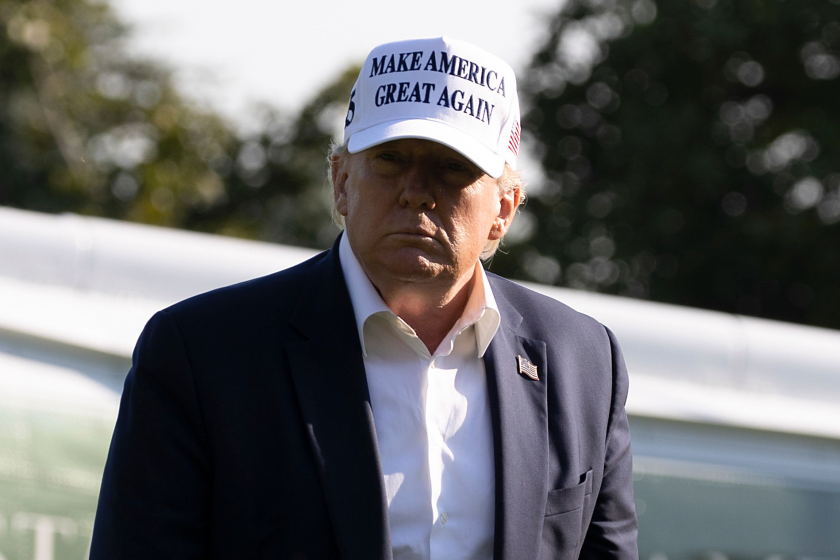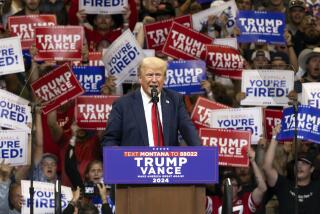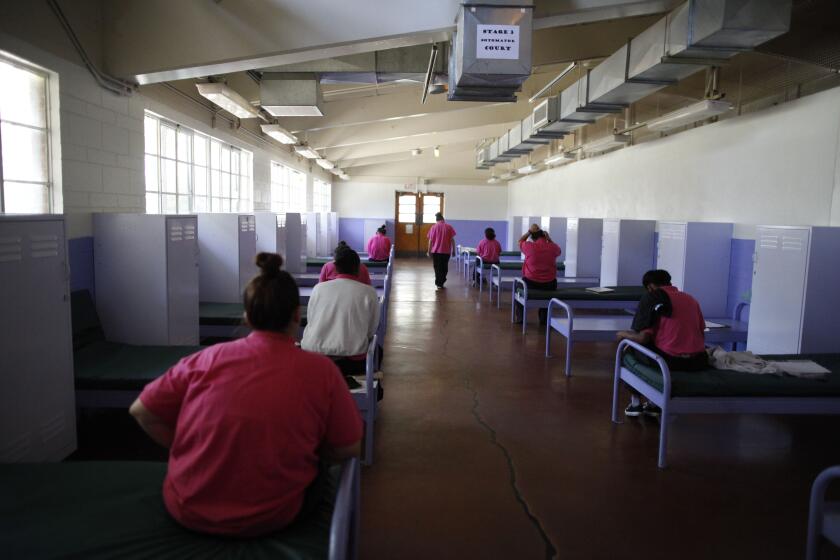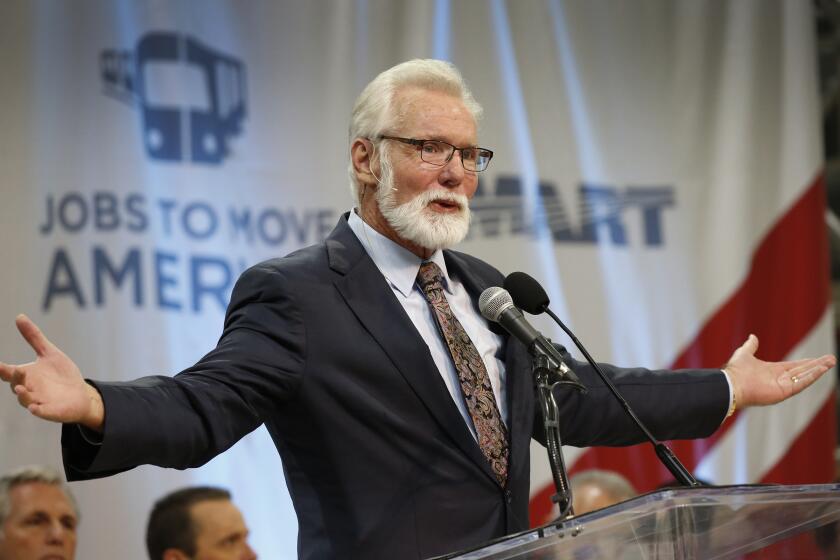‘I must be better than Trump’: Why California’s elections chief is keeping the former president on the ballot
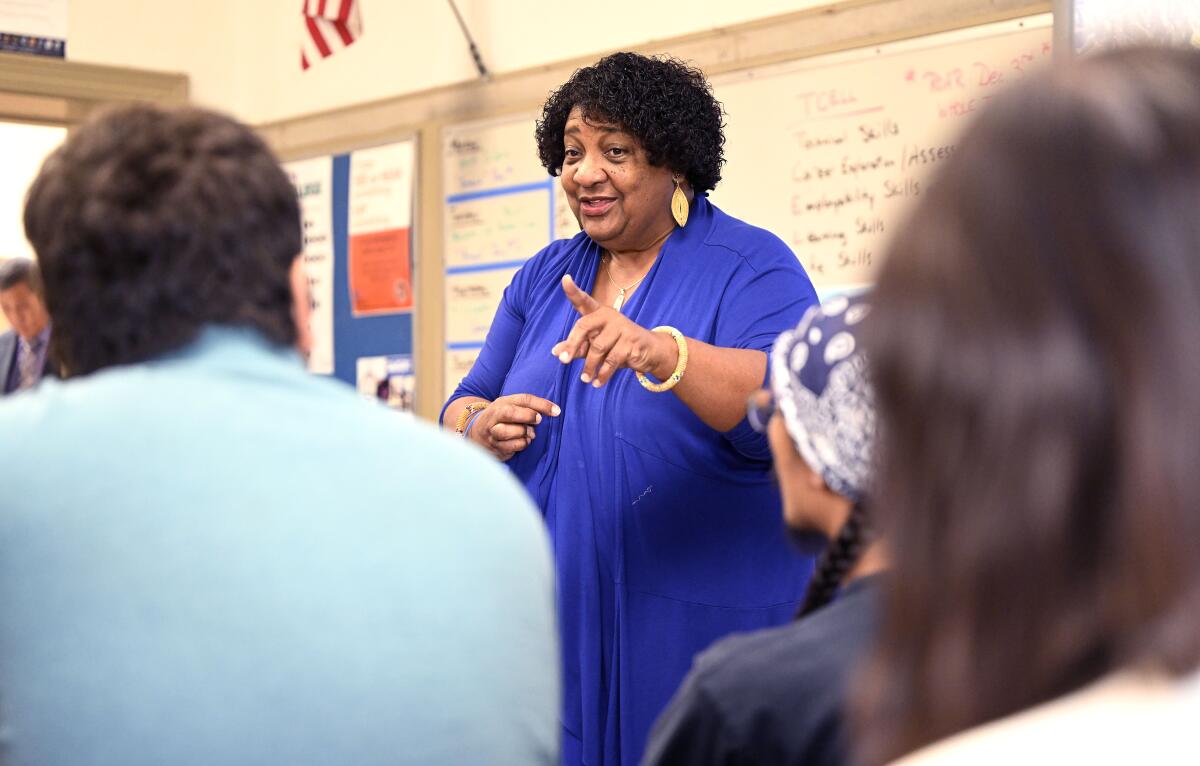
- Share via
SACRAMENTO — California Secretary of State Shirley Weber is resisting pressure from within the Democratic Party to remove Donald Trump from the March statewide primary ballot due to his role in the Jan. 6, 2021, attack on the Capitol — arguing that, unlike the former Republican president, she feels obligated to follow the law.
Weber said she finds Trump’s “behavior and his actions, not just as a former president, but as a citizen of the United States, to be abhorrent and disturbing and an attack on democracy.”
“But at the same time, if I believe in this democracy that is there, I have to basically continue to abide by the rule of law, and for me not to do that, then I am no better than Trump,” Weber told The Times on Friday. “And I must be better than Trump.”
Weber said attorneys in her office have been working for months with the California attorney general’s office and lawyers for local cities and counties to determine whether there was any legal ground to remove Trump from the March 5 primary ballot due to his role in the Capitol insurrection after his loss in the 2020 presidential election. She said the California Constitution does not give her clear authority to take action and leaves the decision to the courts.
Weber was put in the hot seat after Lt. Gov. Eleni Kounalakis sent her a letter Dec. 20 imploring her, the state elections chief, to “explore every legal option to remove former President Donald Trump from California’s 2024 presidential primary ballot.” The letter drew mixed opinions among Democrats.
Weber responded a few days later, stating her commitment to place the sanctity of the electoral process over “partisan politics.”
“I’m not sure why the lieutenant governor says, ‘Use every means possible,’ because we have been doing that,” Weber said Friday. “I haven’t shared that information with her, because she hasn’t asked me.”
Trump critics have filed legal actions to force the secretary of state to remove him from the ballot, but none have succeeded, Weber said. Her office is closely monitoring any potential action from the U.S. Supreme Court.
This isn’t the first time Democrats have tried to keep Trump off the ballot in California. Gov. Gavin Newsom signed a 2019 law to require candidates to disclose their tax returns in order to appear on the presidential primary ballot, a requirement that was shot down by the California Supreme Court.
Newsom agrees with Weber
In a rare rebuke of the lieutenant governor, Newsom criticized the assertion that Trump should be removed from the ballot.
“There is no doubt that Donald Trump is a threat to our liberties and even to our democracy, but in California, we defeat candidates we don’t like at the polls,” Newsom said last week. “Everything else is a political distraction.”
Kounalakis is running to succeed Newsom in California’s 2026 gubernatorial election, and her letter to Weber was largely seen as a way to score political points among Democratic voters.
“In my conversations with some political consultants in recent days, there’s unanimous agreement that sending the letter was heavy-handed and unlikely to provide her with any significant political benefit,” said Darry Sragow, a veteran Democratic strategist.
Sragow said “long-standing political rules of engagement” suggest that such matters need to be adjudicated in the courts, and blatant efforts to intervene can come off as tone-deaf.
The former president will be on California’s March 5 primary ballot, despite calls from some officials to disqualify him because of the Jan. 6 insurrection.
A bad precedent
Weber made the case that public trust in the voting process is more crucial than ever, and she wants to set “the correct precedent for future action.”
“If you do the loosey-goosey kind of interpretation and implementation, then you open us up as a state and a nation for all of us being vulnerable simply because we have an opinion and a point of view,” Weber said.
Close to a third of Republicans say they have a little or no confidence that votes in the Republican presidential primary and caucuses will be counted correctly, according to a recent poll from the Associated Press-NORC Center for Public Affairs Research. That follows years of false claims by Trump that the 2020 presidential election was stolen by President Biden.
Weber said that barring Trump from California’s ballot could be perceived as purely political and embolden his base, and feeds his effort to undermine Democratic institutions.
“I’m very conscious of that it’s not about me, and I know what I would do, but when I’m gone, what would somebody else do? And what could they do?” Weber said. “I don’t want to open a door that is too ugly and that puts everybody at risk,” she said.
‘Complex legal issues’
While Kounalakis said “the Constitution is clear” on the issue, it’s not so simple.
Kounalakis and other state Democrats who support removing Trump from the race point to his role in provoking the Capitol riot and a section of the Constitution that bans from office those who “engaged in insurrection.”
For some Trump critics, Weber’s approach was viewed as too passive, while others applauded her for allowing the traditional route to take its course.
The decision ultimately will be up to the U.S. Supreme Court, which appears destined to review decisions in other states on Trump’s eligibility for the 2024 ballot, said Erwin Chemerinsky, dean of the UC Berkeley School of Law. The high court will have to decide if Trump is eligible under a clause in the 14th Amendment of the U.S. Constitution that prohibits officials from holding office if they have “engaged in insurrection or rebellion” or “given aid or comfort to the enemies thereof.”
It’s unclear if the amendment applies to presidential candidates and if Trump’s role in the Jan. 6 insurrection meets that constitutional threshold.
“It is not going to be for the main election official in Colorado or California to decide. It is a straightforward question about the U.S. Constitution, and the Supreme Court is going to have to decide for the whole country,” Chemerinsky said.
It’s a decision that the constitutional law expert hopes is made quickly, as the November election looms.
“I think the longer it goes, the worse it is for the country,” he said.
The U.S. Supreme Court is pressed to decide soon whether Trump can be prosecuted for election interference — and whether he’s disqualified from seeking reelection in 2024.
What other states are doing
Lawsuits seeking to remove Trump from the ballot have been filed in dozens of states, with mixed results.
Maine and Colorado have moved to bar Trump from their ballots. Maine Secretary of State Shenna Bellow, a Democrat, said Trump violated the Constitution’s insurrectionist ban. The Colorado Supreme Court ruled the same, in a case the state’s Republican Party has appealed to the U.S. Supreme Court.
Supreme courts in Michigan and Minnesota, however, are allowing Trump to stay on the ballot, at least in the March primary, and are leaving the door open for challenges in the November general election.
States are working with a patchwork of procedural laws to navigate the issue, and not all have equal weight in the matter, said Jessica Levinson, a constitutional law professor at Loyola Law School.
In deep-blue California, where Biden won 64% of the vote against Trump in 2020, it may not be worth the “political thicket” for state officials to intervene, Levinson said.
“What Weber is aware of is the fact that to bar [Trump] would be viewed as democracy-limiting or anti-democratic,” she said. “Some would argue that, politically, the benefit here is very small, because we know what the outcome will be in California.”
Times staff writer Jeong Park contributed to this report.
More to Read
Sign up for Essential California
The most important California stories and recommendations in your inbox every morning.
You may occasionally receive promotional content from the Los Angeles Times.
